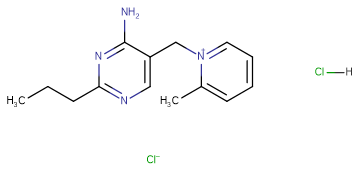
Amprolium Hydrochloride
CAS No. 137-88-2
Amprolium Hydrochloride( Amprol | Amprol 25 | Thiacoccid | NSC 523454 | NSC523454 | Amprolium HCl )
Catalog No. M11564 CAS No. 137-88-2
Amprolium hydrochloride is a coccidiostat used in poultry, is a thiamine analogue and blocks the thiamine transporter of Eimeria species by blocking thiamine uptake it prevents carbohydrate synthesis.
Purity : >98% (HPLC)
 COA
COA
 Datasheet
Datasheet
 HNMR
HNMR
 HPLC
HPLC
 MSDS
MSDS
 Handing Instructions
Handing Instructions
| Size | Price / USD | Stock | Quantity |
| 200MG | 31 | In Stock |


|
| 500MG | Get Quote | In Stock |


|
| 1G | Get Quote | In Stock |


|
Biological Information
-
Product NameAmprolium Hydrochloride
-
NoteResearch use only, not for human use.
-
Brief DescriptionAmprolium hydrochloride is a coccidiostat used in poultry, is a thiamine analogue and blocks the thiamine transporter of Eimeria species by blocking thiamine uptake it prevents carbohydrate synthesis.
-
DescriptionAmprolium hydrochloride is a coccidiostat used in poultry, is a thiamine analogue and blocks the thiamine transporter of Eimeria species by blocking thiamine uptake it prevents carbohydrate synthesis.
-
In Vitro——
-
In Vivo——
-
SynonymsAmprol | Amprol 25 | Thiacoccid | NSC 523454 | NSC523454 | Amprolium HCl
-
PathwayOthers
-
TargetOther Targets
-
Recptorthiamine
-
Research AreaInfection
-
Indication——
Chemical Information
-
CAS Number137-88-2
-
Formula Weight315.24
-
Molecular FormulaC14H19ClN4·HCl
-
Purity>98% (HPLC)
-
SolubilityWater: 63 mg/mL (199.84 mM); DMSO: 2 mg/mL (6.34 mM)
-
SMILESNC1=NC(CCC)=NC=C1C[N+]2=CC=CC=C2C.[H]Cl.[Cl-]
-
Chemical Name1-((4-amino-2-propylpyrimidin-5-yl)methyl)-2-methylpyridin-1-ium chloride hydrochloride
Shipping & Storage Information
-
Storage(-20℃)
-
ShippingWith Ice Pack
-
Stability≥ 2 years
Reference
1.Hamamoto K, et al. J Vet Pharmacol Ther, 2000, 23(1), 9-14.
molnova catalog



related products
-
CCTA-1523
CCTA-1523 is an efflux function of ABCG2 inhibitor. CCTA-1523 selectively reverses ABCG2-mediated MDR in cancer cells.
-
(S)-Lisofylline
(S)-Lisofylline is the inactive optical enantiomer of (R)-lisofylline which is an anti-inflammatory agent. (S)-Lisofylline is exclusively converted to pentoxifylline in human liver microsomes.
-
[Tyr0]-Hypercalcemia...
[Tyr0]-Hypercalcemia Malignancy Factor (1-40)



 Cart
Cart
 sales@molnova.com
sales@molnova.com


